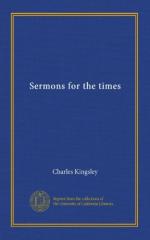First he says, ‘Their understanding was darkened.’ But what part of it? What was it that they had got dark about and could not understand? For in some matters they were as clever as we, and cleverer. What part of their understanding was it which was darkened? St. Paul tells us in the first chapter of the Epistle to the Romans. It was their hearts—their reason, as we should say. It was about God, and the life of God, that they were dark. They had not been always dark about God, but they were darkened; they grew more and more dark about Him, generation after generation; they gave themselves up more and more to their corrupt and fallen nature, and so the children grew worse than their fathers, and their children again worse than them, till they had lost all notion of what God was like. For from the very first all heathens have had some notion of what God is like, and have had a notion also, which none but God could have given them, that men ought to be like God. God taught, or if I may so speak, tried to teach, the heathen, from the very first. If God had not taught them, they would not have been to blame for knowing nothing of God. For as Job says, ’Can man by searching find out God?’ Surely not; God must teach us about Himself. Never forget that man cannot find God; God must show Himself to man of His own free grace and will. God must reveal and unveil Himself to us, or we shall never even fancy that there is a God. And God did so to the heathen. Even before the Flood, God’s Spirit strove with man; and after the Flood we read how the Lord, Jesus Christ the Son of God, revealed Himself in many different ways to heathens. To Pharaoh, king of Egypt, in Abraham’s times; and again to Abimelech, king of Gerar; and again to Pharaoh and his servants, in Joseph’s time; and to Nebuchadnezzar, king of Babylon, and to Cyrus, king of Persia; and no doubt to thousands more. Indeed, no man, heathen or Christian, ever thought a single true thought, or felt a single right feeling, about God or man, or man’s duty to God and his neighbour, unless God revealed it to him (whether or not He also revealed Himself to the man and showed him who it was who was putting the right thought into his mind): for every right thought and feeling about God, and goodness, and duty, are the very voice of God Himself, the word of God whereof St. John speaks, and Moses and the prophets speak, speaking to the heart of sinful man, to enlighten and to teach him. And therefore, St. Paul says, the sinful heathen were without excuse, because, he says, ’that which may be known of God is manifest, that is plain, among them, for God hath showed it to them. For the invisible things of Him from the creation of the world are clearly seen, being understood by the things which are made, even His eternal power and Godhead; so that they are without excuse.’ ‘But these heathens,’ he says, ’did not like to retain God in their knowledge; and when




